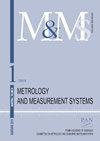Jitter generation model based on timing modulation and cross point calibration for jitter decomposition
IF 1.1
4区 工程技术
Q4 INSTRUMENTS & INSTRUMENTATION
引用次数: 2
Abstract
High-speed serial standards are rapidly developing, and with a requirement for effective compliance and characterization measurement methods. Jitter decomposition consists in troubleshooting steps based on jitter components from decomposition results. In order to verify algorithms with different deterministic jitter (DJ) in actual circuits, jitter generation model by cross-point calibration and timing modulation for jitter decomposition is presented in this paper. The generated jitter is pre-processed by cross-point calibration which improves the accuracy of jitter generation. Precisely controllable DJ and random jitter (RJ) are generated by timing modulation such as data-dependent jitter (DDJ), duty cycle distortion (DCD), bounded uncorrelated jitter (BUJ), and period jitter (PJ). The benefit of the cross-point calibration was verified by comparing generation of controllable jitter with and without cross-point calibration. The accuracy and advantage of the proposed method were demonstrated by comparing with the method of jitter generation by analog modulation. Then, the validity of the proposed method was demonstrated by hardware experiments where the jitter frequency had an accuracy of ± 20 ppm, the jitter amplitude ranged from 10 ps to 8.33 ns, a step of 2 ps or 10 ps, and jitter amplitude was independent of jitter frequency and data rate.基于定时调制和交叉点校准的抖动分解生成模型
高速串行标准正在迅速发展,并要求有效的符合性和表征测量方法。抖动分解包括基于分解结果中的抖动分量的故障排除步骤。为了在实际电路中验证具有不同确定性抖动(DJ)的算法,本文提出了基于交叉点校准和时序调制的抖动分解产生模型。对产生的抖动进行交叉点标定预处理,提高了抖动产生的精度。精确可控的DJ和随机抖动(RJ)是通过定时调制产生的,如数据相关抖动(DDJ)、占空比失真(DCD)、有界不相关抖动(BUJ)和周期抖动(PJ)。通过对比交叉点标定前后可控抖动的产生情况,验证了交叉点标定的优越性。通过与模拟调制产生抖动的方法进行比较,证明了该方法的准确性和优越性。然后,通过硬件实验验证了该方法的有效性,其中抖动频率精度为±20 ppm,抖动幅度范围为10 ps ~ 8.33 ns,步长为2 ps或10 ps,抖动幅度与抖动频率和数据速率无关。
本文章由计算机程序翻译,如有差异,请以英文原文为准。
求助全文
约1分钟内获得全文
求助全文
来源期刊

Metrology and Measurement Systems
INSTRUMENTS & INSTRUMENTATION-
CiteScore
2.00
自引率
10.00%
发文量
0
审稿时长
6 months
期刊介绍:
Contributions are invited on all aspects of the research, development and applications of the measurement science and technology.
The list of topics covered includes: theory and general principles of measurement; measurement of physical, chemical and biological quantities; medical measurements; sensors and transducers; measurement data acquisition; measurement signal transmission; processing and data analysis; measurement systems and embedded systems; design, manufacture and evaluation of instruments.
The average publication cycle is 6 months.
 求助内容:
求助内容: 应助结果提醒方式:
应助结果提醒方式:


